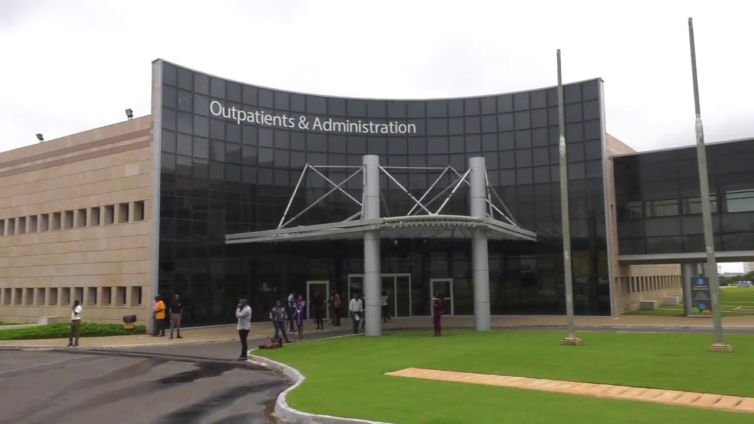The University of Ghana Medical Centre (UGMC), is due for full operationalisation, following its completion and a handing over on Tuesday.
The Project Management Team (PMT) of the Ministry of Health handed the Centre over to the management of the facility at a brief ceremony held at the premises of the Centre.
According to the CEO of the UGMC, Dr Darius Osei, "the Centre has three main focal areas namely a 1,000-bed clinical services section, the biggest medical training and simulation centre in West Africa and a Medical and Scientific Research Centre that will serve as a central hub for local and international research."
In expressing his appreciation, he added, "I am truly excited that Phase II of the UGMC has been completed in the midst of a pandemic of historic proportions".
In an interview with the press, the Director of Medical Affairs of the Clinical Services Section of the UGMC, Dr Kwame Anim-Boamah disclosed that this Section of the Centre housed the biggest Intensive Care Unit in Ghana (a 16-bed Intensive Care Unit) as well as the second biggest Cardiothoracic Centre in the country.
He further said the Health Care section of UGMC had engaged a number of consultants, specialists and sub-specialists with expertise in areas such as Sleep Medicine, Sex Dysfunction, Cardiothoracic Surgery, Urology, Endoscopy, Dermatology, Plastic Surgery, Neurosurgery, ENT, Dental and Ophthalmology for the benefit of the public.
Dr Boamah said the engagement of more international and local sub-specialists was ongoing.
He also revealed that the Imaging Department of the Centre has an angiography machine, a fluoroscopy machine, an MRI, a CT scan, a mammography machine among others to enable the public access these medical imaging services without delays.
Following the handing over, the Director of the UGMC Medical Training and Simulation Centre (MTSC), Professor Aaron Lawson, also stated that the MTSC is well equipped to offer health and non-health workers with training involving patient simulation, simulated clinical environments, simulated virtual procedure stations and simulated standardized patients.
He revealed that some of the training programmes organized by the MTSC include Basic Life Support (CPR) which could help save lives by equipping the public with the basic skills needed to quickly resuscitate individuals whose hearts stop suddenly or go into cardiac arrest before health professionals arrive at the scene.
He added that several other advanced training programmes for professional health workers are also available at the Centre.
The Director of the UGMC Medical and Scientific Research Centre (MSRC), Dr George Kyei revealed that the focus areas of the MRSC include epidemiology/clinical trials, cardiovascular genetics, maternal foetal medicine, regenerative medicine, transplant medicine, infectious diseases, and big data science.
Dr Kyei stated that "The time is ripe for Ghana and Africa to conduct research using our own people and so the Centre is open to collaborations with industry, non-governmental organizations and top universities around the world to achieve this".
Dr Osei, in his concluding remarks, stated that "the UGMC has plans of becoming one of the best destinations for medical tourism in the sub-region and is therefore positioning itself to offer World Class Patient Care, Training and Research in Ghana, Africa and the world".
About the UGMC
The University of Ghana Medical Centre LTD (UGMC) is an ultra-modern medical centre offering world-class health service in Ghana, West Africa and beyond. It is magnificently nestled on the southern part of the University of Ghana, the country's premier university located in Legon, Accra and near the Noguchi Memorial Institute for Medical Research.
The Centre seeks to embody the spirit of hospitality that Ghana is globally acclaimed for and is focused on the deployment of a client-centric approach throughout every facet of its operations.
The construction of the UGMC commenced in 2013 as a turn-key project and Phase I of the project was commissioned in January 2017.
The Centre commenced partial operations in 2018. Phase II of the Project began in 2019 and was completed in December 2021.
Latest Stories
-
Trans-Sahara Project kicks off with reconnaissance visit to Bolgatanga and Tamale
3 minutes -
Black Queens visit Jubilee House after WAFCON heroics; Mahama promises security service recruitment support
10 minutes -
Alien: Earth to Wednesday: 10 of the best TV shows to watch this August
20 minutes -
Forestry Commission condemns illegal shutdown of three district offices in Ashanti Region
36 minutes -
National Security must end interference in Forestry Commission’s work – Anti-Galamsey Coalition cautions
40 minutes -
Keep your eyes on us – MOBA 2015 marks inauguration with a promise to lead and serve
40 minutes -
BoG warns financial institutions violating forex act; threatens to revoke remittance licenses
2 hours -
EPA engages media on land reclamation campaign; vows crackdown on non-compliant miners
2 hours -
Samini set to perform at 2025 Guinness Ghana DJ Awards
2 hours -
Beyond my wildest dreams: A journey to the White House, U.S. Capitol, and a life-changing leadership opportunity
2 hours -
Michael Bartlett‑Vanderpuye named CEO of the Year – Exporter at Ghana CEO Vision, Exhibition & Awards
2 hours -
Women in Aquaculture: COA holds Cold Chain Management training to boost fish preservation
3 hours -
GCB Bank launches digital salary advance product for workers
3 hours -
Kennedy Agyapong officially declares intent to contest NPP primaries
3 hours -
Mr Drew warns DopeNation over comments on ‘This Year’ songwriting credit
3 hours

